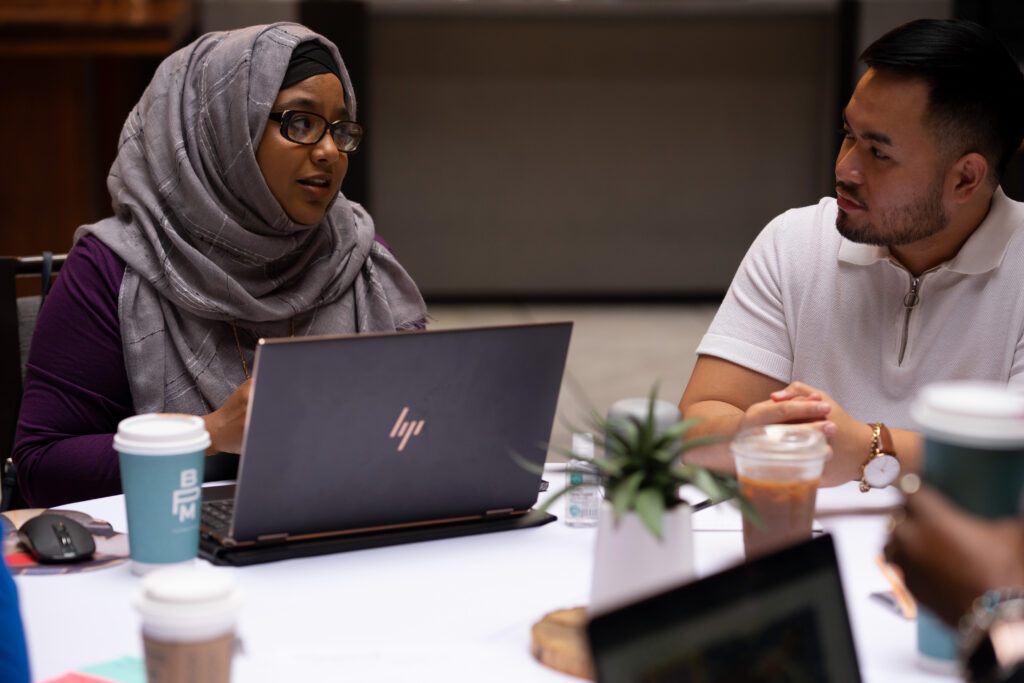A Conversation on Centering Relationships
Part two of our four-part Commit to Shift blog series.
The format of this blog is in dialogue/interview form, transcribed from an actual recording between Namira and Neriel.
“If you have come here to help me, you are wasting your time. But if you have come because your liberation is bound up with mine, then let us work together.”
– Lilla Watson and Aboriginal activists group, Queensland, 1970s

Neriel: First, I wanted to ask you what the commitment of centering relationships means for you.
Namira: There’s been a learning curve to understand it. With my background as a lawyer, you can get into this mindset of prioritizing tasks over relationships, where you’re focused on what needs to get accomplished, how quickly can you do it, your billable hours, and so on. All of this is sitting within this larger context of capitalism, white supremacy culture, and white dominant norms. For centering relationships, I focus on centering the person over the task, being mindful about listening well, and focusing on who that person is as a unique individual. What about you?
Neriel: With white supremacy culture, I think a lot about just how much productivity is prioritized over people. Leaning into centering relationships, it’s doing the reverse and really pushing back on the urgency to get something done. It’s checking in with folks: “Where are you at and how can we work together to make this an experience that is really impactful for everyone getting ‘the work’ done?” Is there anything in your past experiences that you found shifted or changed how you practiced this commitment of centering relationships?
Namira: I was reflecting a lot on restorative practices within this. Sometimes we talk about the need to build trust and people think, “well, we need to build trust before we can even navigate conflict.” And I often re-frame to say that even how we navigate conflict within a new relationship can build trust. Building trust and restoring trust are critical to centering relationships.
Neriel: Right. This deeper level of centering relationships means that you’re going to get to a place that can be very uncomfortable because you’re moving past that surface level. You’re trying to dig deeper and so differences will come up. Somebody can say something that can really harm somebody else. Attending to impact is a big piece of this.
Namira: It makes me think about the other windows and practices in the model. Under Leading Self, the healing work that needs to be done and the centering of inner well-being and authenticity to self in order to have what you need to move through conflict. I also have realized that understanding interpersonal conflict deeply and moving bigger means aligning values and understanding how larger systems impact individual identity formation and the patterns around how we navigate conflict.
Neriel: I really appreciate you naming that. Healing work ties to centering relationships but also to systems-level work, which is happening on a larger scale.
Namira: Yes, exactly. It reflects the Self to Systems approach in our Guide. Centering relationships is not happening in isolation. This Leading People window is for transformational change that we want to see in ourselves in the workplace and across the system. I’m excited to see how folks respond to our leadership practices and we welcome everyone’s thoughts and ways that they’re embedding this in their daily practices. Is there one specific tangible action that comes to mind around implementing this practice?
Neriel: I offer to everyone to check out our reflection questions in the Guide. Even just the first one, “how does your racial identity inform how you navigate interpersonal dynamics with people at work?” is a really great question to journal and self-reflect on.
Namira: Thanks, Neriel. I’d like to offer to people that as we’re thinking about our relationships virtually, looking at meeting structure. Is there a time in your meeting agenda to check in with people and get to know people in a different way? We encourage everyone engaging with our Leadership Practices Publication to leave a commitment to themselves in our Call to Action.
Call to Action
“How does your racial identity inform how you navigate interpersonal dynamics with people at work?” How will you commit to Centering Relationships in 2022?
Leave your thoughts and commitment here!

Namira Islam Anani
Associate Director

Neriel David Ponce
Senior Manager
Did you miss part one in our series on Exploring Identity? You can read the blog here.
#Commit2Shift for Race Equity Impact
Download and bookmark our Self to Systems: Leading for Race Equity Impact publication.
Engage our core commitments, corresponding practices, and reflection questions and participate by answering the Call to Action prompts at the end of each blog in our series.
Support our work and consider making a donation of any size to help us accelerate racial equity throughout the social sector.
Join the Conversation!
